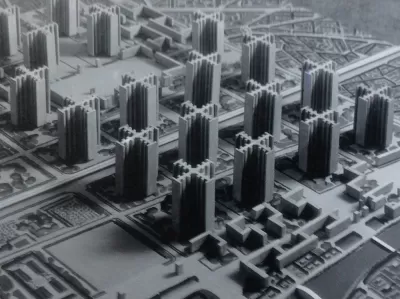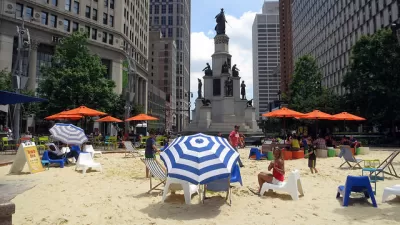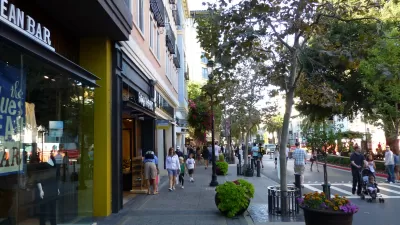Charles Wolfe calls attention to similarities between contemporary urbanism and yesterday's debunked utopias. The two may differ in substance, but both tend toward a certain level of dogma that isn't necessarily helpful on the ground.

"Like today," Charles Wolfe writes, "planning activities of a century ago sought improved residential quality, including a scheme which correlated scaled streets according to use, local stores, the community school, parks, playgrounds, open space, and social interaction among neighbors." These days, he goes on, we often criticize those principles of yesteryear for oversimplification, architectural determinism, and their lack of provisions for environmental sustainability and social equity.
But is it possible that planners of the future will see many of today's urbanist concepts in a similar light? Wolfe writes, "Absent large swaths of single-entity ownership, redevelopment of our current urban landscape is not easy — with limited raw land available for straightforward public or private sector-led development without sophisticated mitigation solutions."
In that context, "prescriptive" goals involving smart growth, placemaking, sustainability, and the like may fail to achieve their visionaries' wider aims without "reality checks against the challenges of design, equity, regulation and financing, and [the need to] be addressed at an integrated and practical level worldwide." We shouldn't be so certain, in other words, that our own utopias aren't as flawed as those of our predecessors.
FULL STORY: Overselling utopia? The urbanist’s dilemma

Study: Maui’s Plan to Convert Vacation Rentals to Long-Term Housing Could Cause Nearly $1 Billion Economic Loss
The plan would reduce visitor accommodation by 25,% resulting in 1,900 jobs lost.

North Texas Transit Leaders Tout Benefits of TOD for Growing Region
At a summit focused on transit-oriented development, policymakers discussed how North Texas’ expanded light rail system can serve as a tool for economic growth.

Using Old Oil and Gas Wells for Green Energy Storage
Penn State researchers have found that repurposing abandoned oil and gas wells for geothermal-assisted compressed-air energy storage can boost efficiency, reduce environmental risks, and support clean energy and job transitions.

Private Donations Propel Early Restoration of Palisades Playground
Los Angeles has secured over $1.3 million in private funding to restore the Pacific Palisades playground months ahead of schedule, creating a modern, accessible space that supports community healing after recent wildfires.

From Blight to Benefit: Early Results From California’s Equitable Cleanup Program
The Equitable Community Revitalization Grant (ECRG) program is reshaping brownfield redevelopment by prioritizing projects in low-income and environmental justice communities, emphasizing equity, transparency, and community benefits.

Planting Relief: Tackling Las Vegas Heat One Tree at a Time
Nevada Plants, a Las Vegas-based nonprofit, is combating the city’s extreme urban heat by giving away trees to residents in underserved neighborhoods, promoting shade, sustainability, and community health.
Urban Design for Planners 1: Software Tools
This six-course series explores essential urban design concepts using open source software and equips planners with the tools they need to participate fully in the urban design process.
Planning for Universal Design
Learn the tools for implementing Universal Design in planning regulations.
Ascent Environmental
Borough of Carlisle
Institute for Housing and Urban Development Studies (IHS)
City of Grandview
Harvard GSD Executive Education
Toledo-Lucas County Plan Commissions
Salt Lake City
NYU Wagner Graduate School of Public Service




























